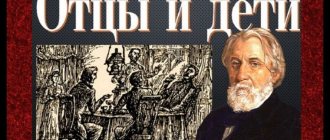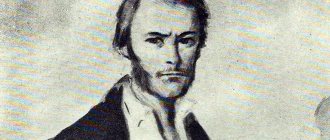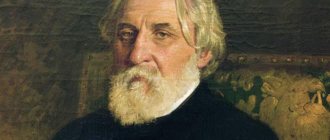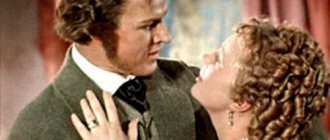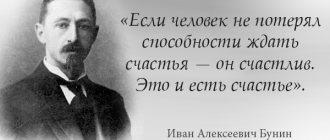Quotes from Evgeniy Bazarov
The theme of the collection is quotes from Evgenia Bazarov, a nihilist student character in I. S. Turgenev’s novel “Fathers and Sons”:
- I only look at the sky when I want to sneeze.
- “You’re flirting,” he thought, “you’re bored and teasing me because you have nothing to do, but I...”
- Such a rich body! At least now to the anatomical theater!
- See what I do; there was an empty space in the suitcase, and I put the hay there; so in our life's suitcase; no matter what they fill it with, as long as there is no emptiness.
- Raphael is not worth a penny, and Russian artists are even less.
- Our peasant is happy to rob himself just to get drunk on dope in a tavern.
- From a penny candle, you know, Moscow burned down.
- Oh, my friend, Arkady Nikolaich! - exclaimed Bazarov, - I ask you one thing: don’t speak beautifully.
- Love is nonsense, unforgivable nonsense.
- The person is good, the circumstances are bad.
- Correct society and there will be no diseases.
- A decent chemist is twenty times more useful than any poet.
- We act on what we recognize as useful
- Because, brother, that, according to my observations, only freaks think freely between women.
- If they tell me the case, I will agree.
- Nature is not a temple, but a workshop, and man is a worker in it.
- If they crush you, that's the way to go.
- The only good thing about a Russian person is that he has a very bad opinion of himself.
- Upbringing? - Bazarov picked up. - Every person must educate himself - well, at least like me, for example... And as for time - why will I depend on it? It’s better to let it depend on me. No, brother, this is all licentiousness, emptiness! And what is this mysterious relationship between a man and a woman? We physiologists know what this relationship is. Study the anatomy of the eye: where does that mysterious look come from, as you say? This is all romanticism, nonsense, rot, art.
- Well, if he deserves contempt!
- “You want to love,” interrupted Bazarov, “but you cannot love: that is your misfortune.”
- This is none of our business...we need to clear the place first.
- “Here you go! I was scared of the women!”
Topics of the issue: quotes from Bazarov Evgenia is a revolutionary democrat, he is against the liberal ideas of the Kirsanov brothers, as well as the conservative views of his parents.
vse-frazi.ru
Please write Bazarov's aphorisms!
Please write Bazarov's aphorisms!
- nature is not a temple, but a workshop and man is a worker in it.
- 1. “Such a rich body!
At least now to the anatomical theater" 2. "The materialism that you preach has been in use more than once and has always turned out to be untenable.” 3. “Only freaks think freely between women”, 4. “Nature is not a temple, but a workshop 5.” People are like trees in the forest”... 6. “They cut down the forest - the chips fly” 7. “Every person is a mystery.” 8. "Now it's dark" - Nature is not a temple, but a workshop. Man, this sounds proud. A decent chemist is twenty times more useful than any poet. You and I are the same frogs, Bazarov explains human physiology to the yard boys. People are like trees in the forest. They cut down the forest, and the chips fly.
When I meet a person who would not give up in front of me, then I will change my opinion about myself. Such a rich body! At least now in the anatomical theater this is how Bazarov evaluates Odintsov’s beautiful specimen of the same frog. Blow on the dying lamp and let it go out - APHORISMS IN THE NOVEL FATHERS AND CHILDREN. Half of the poems of Woe from Wit became proverbs, as A.S. Pushkin predicted.
There is nothing to say about Krylov’s fables. But in Russian literature there is another source of aphorisms - the novel by I. S. Turgenev Fathers and Sons. Perhaps this is not such a rich source as the poems of Griboedov and Krylov, perhaps the aphorism of the statements of Bazarov and other heroes of the novel has not entered so widely into our speech, but the genre of Turgenev’s philosophical novel is not the genre of comedy or fable. And yet...Nature is not a temple, but a workshop. The entire structure of the novel denies this Bazarov philosophy. By the end of the novel, Bazarov himself comes to the realization of his mistake. But the phrase remained, and the second half of it (the person in it is a worker) was more than once presented as a synonym for Gorky’s Man - it sounds proud. It’s good, of course, that another statement by Bazarov, the well-known words about a decent chemist, did not become a guide to action for modern leaders of progress. However... The now forgotten discussion about physicists and lyricists at the time of the scientific and technological revolution twenty to thirty years ago took place under this sign. Surprisingly accurately and succinctly Turgenev formulated through the mouth of his hero the credo of physiologists (Pavlov and others). You and I are the same frogs,” Bazarov explained human physiology to the yard boys. The sinister meaning of this phrase, put into it by Turgenev, was revealed at the beginning of the 20th century, when Bulgakov’s Fatal Eggs and The Heart of a Dog showed all the horror of such an approach to nature and man. Bazarov’s aphorisms about human upbringing, about psychology and the complex mental life that he at the beginning was inclined to deny his field, also carry a frighteningly prophetic meaning, unclear, of course, for the hero, but anticipated by the author. People are like trees in the forest... From here it is one step to the famous: The forest is cut down - the chips fly. Not a single botanist, as Bazarov said, will study each individual birch tree. Of course, if there is no fundamental difference between wood and man (and wood is not even a frog!), there will always be a botanist who will tear the Russian forest to pieces. And they let him in. So, if primitive man saw a dryad in a tree, a naiad in a stream, that is, a soul, then the physiologist Bazarov, who did not want to see a soul in man himself, is one step away from some kind of cyborg. And Bazarov’s attitude towards love is completely in the spirit of this logic. Do frogs really have love? And you and I are the same frogs. This means that there is no mysterious relationship between a man and a woman. Mbi, physiologists, we know what this relationship is. And women... Only freaks think freely between women,” says Bazarov. In a totalitarian state, Turgenev's wonderful hero would have made a career as the Benefactor from Zamyatin's novel. Personality is abolished, so everyone is Us. Love is cancelled, everyone is given tickets for physiological relationships. Freedom of thought is also useless. Neither women nor men think freely anymore. However, for himself Bazarov leaves some heights unattainable for others. He is famous for saying: When I meet a person who would not give up in front of me, then I will change my opinion about myself. This means that you and I are frogs, trembling creatures, and Bazarov, it turns out, has the right, in the words of another superman, who no longer flattened frogs, but killed a man. And for Raskolnikov, man was also a frog, a louse. However, such superhumans even really like some anatomically interesting specimens. Such a rich body! At least now to the anatomical theater - this is how Bazarov evaluates a beautiful specimen of the same frog. Once upon a time we wrote an essay on the topic: Why didn’t Odintsova respond to Bazarov’s love? Would you respond to the love of an individual who is voluptuously wondering how best to put you under the scalpel? As one would expect, nature managed to avenge itself; the frog turned out to be not a trembling creature, but a frog princess, the secret of which Bazarov did not comprehend, having lost before the evil
Attention, TODAY only!
growthsummitrussia.ru
Do you know the answer?
Items
New questions
Site rating
- 1. Daniil Vasiliev 450
- 2. Alexander S 445
- 3. Daria Zavgorodnyaya 225
- 4. Igor Proskurenko 174
- 5. Isabella Bevz 136
- 6. Herodotus Abazbek 127
- 7. Vladimir Kuntin 106
- 8. Anton Kovalevich 98
- 9. Nastya Nikitina 95
- 10. Niya B 94
- 1. Kristina Volosocheva 19.120
- 2. Ekaterina 18,721
- 3. Yulia Bronnikova 18,580
- 4. Darth Vader 17,856
- 5. Alina Saibel 16,787
- 6. Igor Proskurenko 15,904
- 7. Maria Nikolaevna 15,775
- 8. Larisa Samodurova 15,735
- 9. Liza 15,165
- 10. TorkMen 14,876
The most active participants of the week:
- 1. Victoria Neumann - bookstore gift card for 500 rubles.
- 2. Bulat Sadykov - bookstore gift card for 500 rubles.
- 3. Daria Volkova - bookstore gift card for 500 rubles.
Three lucky people who passed at least 1 test:
- 1. Natalya Starostina - bookstore gift card for 500 rubles.
- 2. Nikolay Z - bookstore gift card for 500 rubles.
- 3. David Melnikov - bookstore gift card for 500 rubles.
The cards are electronic (code), they will be sent in the coming days via VKontakte message or email.
Source
Bazarov's aphorisms as a reflection of the hero's worldview
I. S. Turgenev’s novel “Fathers and Sons” is a controversial, interesting work that has not lost its relevance today. Relations between generations, innovation and continuity, the struggle between the old and the advanced, respect for life experience, following authorities and the ability to find your own path in life - these and many other problems are considered in the work thoroughly and comprehensively. As if alive, the “old Kirsanovs” stand before us, symbolizing the older generation, and the “youth” - Arkady and his friend Evgeny Bazarov.
Special person
Being the central figure of the novel, it is Bazarov who bears the main ideological and semantic load of the work. This is quite fair, because he has an extraordinary personality, a strong and deep nature. Turgenev calls him “self-deluded,” emphasizing that the hero formed and cultivated the lion’s share of his outstanding qualities himself. Bazarov’s aphorisms, of which there are many presented in the text of the work, help the writer to reveal more clearly, and for us, the readers, to understand the paradoxical, unique personality of Evgeniy Vasilyevich, to trace the stages of his mental and spiritual development, the formation of his worldview.
If you try to group all of Bazarov’s aphorisms by semantic features, you will notice the following pattern. The hero speaks out about things that deeply concern the author himself. And Turgenev, who does not always agree with his brainchild, argues with Bazarov, citing “iron” arguments. This concerns, first of all, the views of the young commoner on nature and art. Bazarov’s aphorisms on this topic reveal him as a materialist to the tips of his nails, striving to find only practical benefits in all spheres of life. He categorically asserts that nature is not a temple of divine beauty and harmony, but just a workshop, and a person in it not only receives aesthetic pleasure and joy from communicating with beauty, but must work. The character also has a utilitarian attitude towards art. In his opinion, Raphael is not worth a penny, and a good chemist is much more useful than all the poets and writers put together.
Naturally, Turgenev, a subtle connoisseur of the beauty of the surrounding world, who inspiredly praised it in his works, does not accept such aphorisms of Bazarov, cannot agree with them. Using the technique of contrast, he responds to his hero by describing in the next scene the unique charm of a summer evening, the sweetness of the air filled with the aromas of blooming nature, the high transparency of the twilight sky in the sparkling brilliance of the stars. The landscape sketch is conveyed by the author through Nikolai Petrovich Kirsanov, who is in many ways close to Turgenev in his way of thinking, character and spiritual values. And the poems that the hero remembered correspond to the poetic picture of evening nature. Thus, Turgenev refutes the functional-consumer attitude towards everything beautiful, preached by Bazarov. A person devoid of an aesthetic principle cannot be a full-fledged person, cannot be the spiritual being that the Lord created him. Turgenev is convinced of this. And therefore, once again he very firmly debunks these aphorisms of Bazarov. “Fathers and Sons” is a novel not only about the socio-political situation in Russia in the 2nd half of the 19th century. This is also a psychological novel about internal storms and the evolution of the soul. In the scene of Bazarov’s declaration of love for Odintsova, in order to more clearly convey the storm of feelings and emotions in the hero’s soul, the writer again draws a night landscape. And Evgeny perceives it completely differently, without any ostentatious skepticism. After all, the state of nature turned out to be extremely similar to his own!
Philosophical views
But not all of Evgeny Bazarov’s aphorisms are perceived with hostility by the author, although they sometimes seem overly categorical. For example, his words are filled with stoicism and real fighting will: “Whoever is angry at his pain will certainly defeat it.” And we remember how courageously Bazarov died, how steadfastly he stood in the face of physical and moral suffering. No wonder Pisarev called the last minutes of the hero’s life a feat. We find another statement that shows pride and self-confidence, great conceit, but also the highest degree of human dignity and independence in the text of the novel: “As for time, why will I depend on it? It’s better to let it depend on me.” Indeed, only a self-sufficient person could say so!
Bazarov’s language - bright and figurative - is not limited to the listed statements, which have long become popular. To better know and understand the hero, read the text of the novel! Fathers and Sons is worth your time!
The novel "Fathers and Sons" has a complex structure and multi-level conflict. Purely outwardly, he represents a contradiction between two generations of people. But this eternal is complicated by ideological and philosophical differences. Turgenev's task was to show the harmful influence of certain philosophical movements on modern youth, in particular nihilism.
Broken heart
Unappreciated love leads Bazarov to difficult emotional experiences and completely unsettles him. He lost the purpose and meaning of life. In order to somehow unwind, he goes to his parents and helps his father in his medical practice. As a result, he contracted typhus and died. But first his soul died from love, unable to survive the suffering of love. And only then the body.
At the end of the work, Turgenev sums up that man was created in order to love, admire and feel. Denying all this, he is simply doomed to death.
The novel "Fathers and Sons" has a complex structure and multi-level conflict. Purely outwardly, he represents a contradiction between two generations of people. But this eternal is complicated by ideological and philosophical differences. Turgenev's task was to show the harmful influence of certain philosophical movements on modern youth, in particular nihilism.
What is nihilism?
Nihilism is an ideological and philosophical movement, according to which there are and cannot be authorities, and none of the postulates should be taken on faith. (as he himself notes) is a merciless denial of everything. The philosophical basis for the formation of nihilistic teaching was German materialism. It is no coincidence that Arkady and Bazarov suggest that Nikolai Petrovich read Buchner instead of Pushkin, in particular his work “Matter and Force”. Bazarov’s position was formed not only under the influence of books and teachers, but also from living observation of life. Bazarov's quotes about nihilism confirm this. In a dispute with Pavel Petrovich, he says that he would gladly agree if Pavel Petrovich presented him with “at least one resolution in our modern life, in family or public life, that would not cause complete and merciless denial.”
Scientific views
Arkady Kirsanov
“You should arrange your life in such a way that every day is significant.”
“When a maple leaf falls to the ground, it looks like a butterfly, and this is strange - because the driest and deadest is similar to the most cheerful and lively.”
“There must be something special, some kind of vanity, in the feeling of a person who knows and says that he is poor.”
Nikolai Petrovich Kirsanov
“Either I’m stupid, or this is all nonsense.
I must be stupid." “...as soon as he passed his eighteenth year, and placed him in the university...”
“...In 1835 Nikolai Petrovich left the university as a candidate...”
“... Nikolai Petrovich was afraid of the young “nihilist” ...”
...And he looked around, as if wanting to understand how one could not sympathize with nature...”
Pavel Petrovich Kirsanov
“Personality, dear sir, is the main thing;
The human personality must be as strong as a rock, for everything is built on it.” “They [the Russian people] sacredly honor traditions, they are patriarchal, they cannot live without faith.”
“A thought occurred to me; Why not express it?”
“Without self-esteem, without self-respect—and in an aristocrat these feelings are developed—there is no solid foundation... for a public building...”
“Let us do our duty; and look, we will also get happiness into the bargain.”
The science
What does Bazarov value? After all, he cannot have a sharply negative attitude towards everything. The only thing the hero sees value and benefit in is science. Science as the basis of knowledge and human development. Of course, Pavel Petrovich, as an aristocrat and a representative of the older generation, also values and respects science. However, for Bazarov, the ideal is German materialists. For them, love, affection, feelings do not exist; for them, a person is simply an organic system in which certain physical and chemical processes occur. The main character of the novel “Fathers and Sons” is inclined to the same paradoxical thoughts.
Bazarov's nihilism comes into question; it is tested by the author of the novel. Hence, an internal conflict arises, which no longer occurs in the Kirsanovs’ house, where Bazarov and Pavel Petrovich argue every day, but in the soul of Evgeny himself.
About the change in the soul of the main character
It is difficult for most of us to remember in which chapter Bazarov talks about love, but we will not be mistaken if we follow Evgeniy and Anna into the garden where they were walking. This woman, seeing that Evgeny had a strong feeling for her, managed to provoke him into frankness and hear a confession.
For Bazarov, Odintsova’s infatuation turns out to be so strong that he can no longer apply his pragmatic theory to what is happening in his life. Eugene now cares about one single woman - Anna, for whom personal peace of mind is above all passions. Odintsova is interested in Bazarov, but she refuses to reciprocate his feelings.
The main character is rejected. Evgeniy is very worried and, upon arriving home, devotes himself entirely to work in order to forget about his feelings. This is how Bazarov changes. Eugene's attitude towards love in this part of the novel is completely different. Now this is no longer a pragmatic nihilist, but a person who is completely captured by feeling.
The future of Russia and nihilism
Bazarov, as a representative of the advanced direction of Russia, is interested in its future. So, according to the hero, in order to build a new society, it is first necessary to “clear the place.” What does this mean? Of course, the hero’s expression can be interpreted as a call for revolution. The development of the country must begin with radical changes, with the destruction of everything old. At the same time, Bazarov reproaches the generation of liberal aristocrats for their inaction. Bazarov speaks of nihilism as the most effective direction. But it is worth saying that the nihilists themselves have not yet done anything. Bazarov's actions are manifested only in words. Thus, Turgenev emphasizes that the heroes - representatives of the older and younger generations - are very similar in some ways. Evgeny's views are very frightening (this is confirmed by Bazarov's quotes about nihilism). After all, what is any state built on first of all? On traditions, culture, patriotism. But if there are no authorities, if you don’t appreciate art, the beauty of nature, and don’t believe in God, then what remains for people? Turgenev was very afraid that such ideas could come true, and that Russia would then have a very hard time.
Tragedy of the Nihilist
So, a change has occurred in Bazarov’s soul that refutes all his theories. His feeling for Anna Sergeevna is deep and strong. Initially he tries to brush it off. However, Odintsova challenges him to a frank conversation while walking in the garden and receives a declaration of love.
Bazarov does not believe that Anna Sergeevna’s feelings for him are mutual. Nevertheless, the love in Bazarov’s life instills in his heart hope that she will be disposed towards him. All his thoughts, all his aspirations are now connected with one single woman. Bazarov only wants to be with her. Anna Sergeevna prefers not to give him hope for reciprocity, choosing peace of mind.
The rejected Bazarov is having a hard time. He goes home, trying to lose himself in work. It becomes clear that Bazarov’s previous attitude towards love is forever in the past.
Internal conflict in the novel. Test of love
There are two key characters in the novel who supposedly play a cameo role. In fact, they reflect Turgenev’s attitude towards nihilism; they debunk this phenomenon. Bazarov’s nihilism begins to be comprehended by him a little differently, although the author does not tell us this directly. So, in the city, Evgeniy and Arkady meet Sitnikov and Kukshina. They are innovative people who are interested in everything new. Sitnikov is an adherent of nihilism; he expresses his admiration for Bazarov. At the same time, he behaves like a buffoon, he shouts nihilistic slogans, it all looks ridiculous. Bazarov treats him with obvious contempt. Kukshina is an emancipated woman, simply sloppy, stupid and rude. That's all that can be said about the heroes. If they are representatives of nihilism, on which Bazarov places such high hopes, then what is the future of the country? From this moment on, doubts appear in the hero’s soul, which intensify when he meets Odintsova. The strength and weakness of Bazarov's nihilism manifest themselves precisely in the chapters where the hero's love feelings are spoken of. He resists his love in every possible way, because it is all stupid and useless romanticism. But his heart tells him something else. Odintsova sees that Bazarov is smart and interesting, that there is some truth in his ideas, but their categoricalness betrays the weakness and dubiousness of his beliefs.
Odintsova
Regarding the topic “Bazarov: attitude to love,” it should be noted that in the conversation Odintsova began to choose topics that were interesting to him, they began to speak the same language, and this could not but have a positive impact on their relationship.
For this hero, love has become too serious a test of loyalty to nihilistic ideals. Bazarov had never experienced anything like this before and generally thought that he was not inclined towards romance. But in reality it turned out that all people are the same in regard to love, because she does not ask when to come. Bazarov's attitude becomes unhealthy and eventually begins to differ.
Odintsova was a very smart woman, and it cannot be said that she was not carried away by this amazing man. Anna Sergeevna thought a lot about him and even challenged him to be frank, however, having received a declaration of love in response, she immediately rejected him, because what was dearer to her was her usual way of life and comfort than a simple fleeting infatuation. However, here Bazarov could no longer control himself. His attitude towards love began to change, and in the end it finished him off.
Turgenev's attitude towards his hero
It is not for nothing that a heated controversy has developed around the novel “Fathers and Sons”. Firstly, the topic was very topical. Secondly, many representatives of literary criticism were, like Bazarov, fascinated by the philosophy of materialism. Thirdly, the novel was bold, talented and new.
There is an opinion that Turgenev condemns his hero. That he slanderes the younger generation, seeing only the bad in them. But this opinion is wrong. If you look at Bazarov’s figure more closely, you can see in him a strong, purposeful and noble nature. Bazarov's nihilism is only an external manifestation of his mind. Turgenev, rather, feels disappointed that such a talented person is fixated on such an unjustified and limited teaching. Bazarov cannot but inspire admiration. He is daring and brave, he is smart. But besides this, he is also kind. It is no coincidence that all the peasant children are drawn to him.
As for the author's assessment, it is most fully manifested in the ending of the novel. Bazarov’s grave, which his parents come to, is literally buried in flowers and greenery, and birds sing over it. It is unnatural for parents to bury their children. The beliefs of the protagonist were also unnatural. And nature, eternal, beautiful and wise, confirms that Bazarov was wrong when he saw in it only material for achieving human goals.
Thus, Turgenev’s novel “Fathers and Sons” can be seen as a debunking of nihilism. Bazarov's attitude towards nihilism is not just a philosophy of life. But this teaching is questioned not only by representatives of the older generation, but also by life itself. Bazarov, in love and suffering, dies from an accident, science is unable to help him, and over his grave Mother Nature is still beautiful and calm.
Last meeting
The main character was destined to meet his beloved again. Being terminally ill, Evgeniy sends a messenger for Anna Sergeevna. Odintsova comes to him with a doctor, but she does not rush into his arms. She was simply afraid for Bazarov. Evgeniy dies in her arms. By the end of his life he remains absolutely alone. Bazarov is rejected by everyone, only the elderly parents continue to selflessly love their son.
So, we see how much Bazarov’s attitude towards love changed when he met his feminine ideal in the person of Anna Sergeevna. The tragedy of this hero turned out to be very similar to the love disappointments that probably everyone experienced. We meet a person whom we consider ideal, but he turns out to be unattainable for some reason. We suffer from lack of attention, not noticing that loved ones are ready to give a lot for us. Towards the end of his life, Bazarov finally begins to understand the power of parental love: “People like them cannot be found in our world during the day.” However, such an important understanding comes to him too late.
Turgenev wrote the famous novel “Fathers and Sons” in 1862 and touched upon the deep philosophical, political and moral problems of the people of that time. The main character was the young democrat commoner Evgeniy Bazarov. To explore the topic “Bazarov’s Attitude to Love” more deeply, let’s first figure out what kind of person he was. And let us mention in advance that it was love that broke this strong and strong-willed man, playing a cruel joke on him. But first things first.
